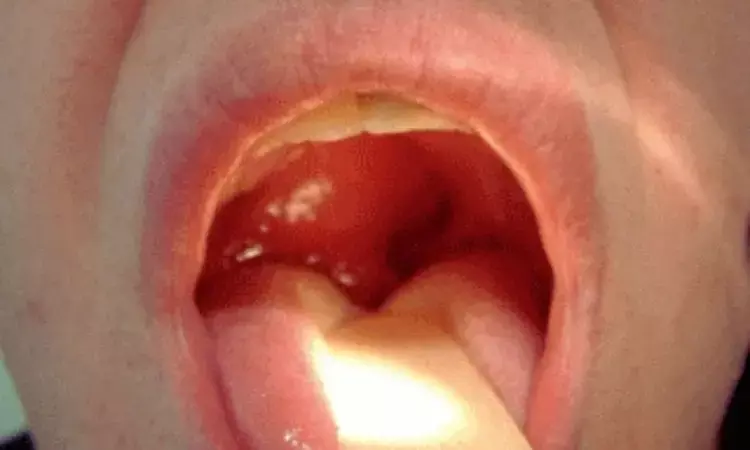- Home
- Medical news & Guidelines
- Anesthesiology
- Cardiology and CTVS
- Critical Care
- Dentistry
- Dermatology
- Diabetes and Endocrinology
- ENT
- Gastroenterology
- Medicine
- Nephrology
- Neurology
- Obstretics-Gynaecology
- Oncology
- Ophthalmology
- Orthopaedics
- Pediatrics-Neonatology
- Psychiatry
- Pulmonology
- Radiology
- Surgery
- Urology
- Laboratory Medicine
- Diet
- Nursing
- Paramedical
- Physiotherapy
- Health news
- Fact Check
- Bone Health Fact Check
- Brain Health Fact Check
- Cancer Related Fact Check
- Child Care Fact Check
- Dental and oral health fact check
- Diabetes and metabolic health fact check
- Diet and Nutrition Fact Check
- Eye and ENT Care Fact Check
- Fitness fact check
- Gut health fact check
- Heart health fact check
- Kidney health fact check
- Medical education fact check
- Men's health fact check
- Respiratory fact check
- Skin and hair care fact check
- Vaccine and Immunization fact check
- Women's health fact check
- AYUSH
- State News
- Andaman and Nicobar Islands
- Andhra Pradesh
- Arunachal Pradesh
- Assam
- Bihar
- Chandigarh
- Chattisgarh
- Dadra and Nagar Haveli
- Daman and Diu
- Delhi
- Goa
- Gujarat
- Haryana
- Himachal Pradesh
- Jammu & Kashmir
- Jharkhand
- Karnataka
- Kerala
- Ladakh
- Lakshadweep
- Madhya Pradesh
- Maharashtra
- Manipur
- Meghalaya
- Mizoram
- Nagaland
- Odisha
- Puducherry
- Punjab
- Rajasthan
- Sikkim
- Tamil Nadu
- Telangana
- Tripura
- Uttar Pradesh
- Uttrakhand
- West Bengal
- Medical Education
- Industry
Poor Oral Health Linked to Greater Severity of Peritonsillar and Cervical Infections: Study Shows

Romania: A new study published in Frontiers in Medicine has highlighted a possible connection between dental status and the clinical course of serious oropharyngeal infections. The research, led by Florian Ciprian Venter from the Doctoral School of Biological and Biomedical Sciences, University of Oradea, Romania, along with colleagues, examined how oral health may influence the severity and management of peritonsillar and cervical infections.
Peritonsillar phlegmon and laterocervical abscesses are complications of oropharyngeal infections that can escalate quickly, requiring urgent medical attention. While poor oral hygiene and dental issues have long been acknowledged as risk factors for such infections, the study delved deeper into whether dental status affects the severity of these conditions and the treatment approach required.
The researchers conducted a retrospective cohort analysis of patients hospitalized with peritonsillar phlegmon, peritonsillar abscess, or laterocervical/submandibular abscess. Data on dental health—such as the presence of dental implants, prior dental procedures, and general dentition status—were examined alongside clinical outcomes like treatment complexity and length of hospital stay.
Findings revealed several notable trends, which are summarized as follows:
- Patients with a history of dental work were more likely to require complex treatments, including corticosteroid therapy.
- Individuals with poor dentition also showed a higher likelihood of undergoing complex treatments.
- Patients without dental implants received antibiotics more frequently.
- The absence of dental implants was associated with longer hospital stays.
- Poor dentition, despite less frequent corticosteroid use, was linked to more severe infection types.
- Inadequate oral health appeared to be associated with a stronger inflammatory response and a more complicated infection course.
The study concluded that dental health may influence not only the nature of oropharyngeal infections but also how aggressively they must be treated. Although the data did not establish a direct causal relationship, the observed associations support the idea that oral health plays a significant role in infection outcomes.
“These results highlight the importance of incorporating dental evaluations into the broader management of head and neck infections,” the authors noted. They emphasized the need for a collaborative approach involving ENT specialists and dental professionals to better address such infections and potentially reduce their severity through preventive care.
The researchers also called for future prospective studies to further investigate the role of oral hygiene and microbial factors in the development and progression of these infections. They suggest that early dental intervention and routine oral health monitoring could serve as valuable strategies to curb the severity and improve the prognosis of peritonsillar and cervical infections.
They concluded, "Overall, the study highlights the broader implications of dental health beyond the oral cavity, reinforcing its importance in systemic health and infection control."
Reference:
Venter, F. C., Ghitea, T. C., Venter, A. N., Ghitea, E. C., Ghitea, M. C., & Venter, A. (2025). The role of dental status in the pathogenesis and severity of peritonsillar and cervical infections. Frontiers in Medicine, 12, 1590310. https://doi.org/10.3389/fmed.2025.1590310
Dr Kamal Kant Kohli-MBBS, DTCD- a chest specialist with more than 30 years of practice and a flair for writing clinical articles, Dr Kamal Kant Kohli joined Medical Dialogues as a Chief Editor of Medical News. Besides writing articles, as an editor, he proofreads and verifies all the medical content published on Medical Dialogues including those coming from journals, studies,medical conferences,guidelines etc. Email: drkohli@medicaldialogues.in. Contact no. 011-43720751


